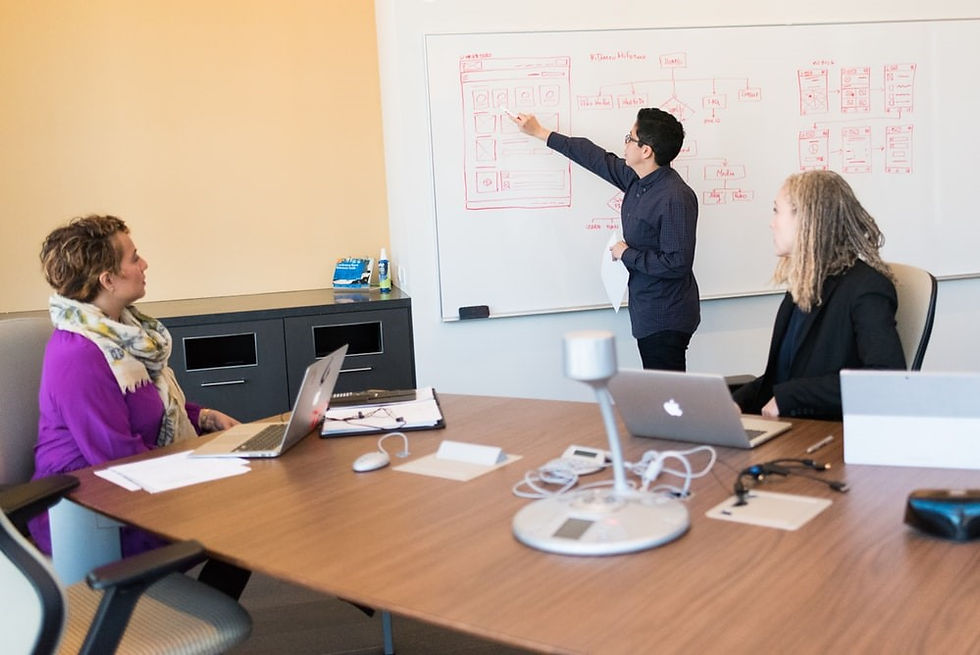The 5 Areas Of Truly Effective Employee Development
- maxpotenti

- May 13, 2020
- 4 min read
Updated: Oct 5, 2020
What if you invest in employees and they leave? Fair question. But not investing in anyone is hardly more likely to get them to stay. And, by devoting the time, money and resources to your team, you develop their skill set and knowledge base – what’s the cost of not investing in employees that stick around?
Both long- and short-term benefits await businesses that have a consistent development programme. Immediately, you strike a better relationship with everyone who works for you. They know you’re supporting them to maximise the value of their role whilst also teaching them why it’s valuable in the first place.
Over time, the business starts to thrive with a more focused, capable workforce. Their development isn’t just a promise – it’s a result. Training and education will lead to more effective succession planning What Is Succession Planning And Why Is It So Important?, making any leadership transition a smoother process.
We can boil the importance of employment development, like these programmes, down to five main areas:
1. Professional training
You must always be conscious of identifying where people fall short, right now, in terms of their skills and approaches to a task. By that, we don’t just mean their capabilities. Consider the nature of the job itself, and whether the requirements that you believe are necessary truly are, or if they should be realigned.
Then it’s a case of formal employee training. This is key for consistency. And the results are tremendous. The Association for Talent Development has revealed that companies with a comprehensive, progressive training plan see a 218% jump in profits per employee, compared to those without.
Industry standards count, but so do yours. Think about how you can reach both within the context of your culture.
2. Cross-departmental training
Silos can be fantastic for independence and maintaining a tight hold on workflow. Yet with too much emphasis, they can erode your business structure. Teams should learn how to work across departments as much as within their niche. Even a small degree of cross-training can encourage those professional relationships, and foster knowledge or metric sharing.
On a practical level, it’ll increase skill levels, as teams have a firm idea of where else they can turn to bolster or enhance their objective.
Who benefits from employee development? Everyone. That’s a message your managers should be filtering throughout their department and others. People must be aware of how they fit into the broader scheme of what you do.
3. Soft skills
These aren’t about technical or industry awareness – more how your employees relate to each other personally, and how well they communicate.
Listening, speaking, sharing, politeness and privacy… Soft skills are among some of the strongest and most compelling attributes a person can possess. It’s no surprise they were the number one skill valued by employers, talent experts and managers in 2018. Today, that’s no different. Emotional intelligence can never be underrated.
Soft skills can be emphasised in your training plans. Teach employees how to read body language, for instance, or talk to each other without a hint of conflict. Lead by example and give your managers the exact same benchmark.
4. Mentoring
When we ask how to improve employee development, we can’t just fall back on our staff handbook. Imagine a new employee walking through the door. Do they know what to do? What’s expected of them? Ways in which to act or deliver a project? Great. However, a mentor is much more beneficial than just being given the basic new-starter pack.
It can be utterly transformative. A ‘do as your told’ philosophy may get the job done, but it won’t inspire anyone. Swap an autocratic style for a collectivist spirit. Competition is important but only if it’s healthy. Heading an ultra-competitive culture is useful up to a point, after which the work-life balance collapses and people will want to move on.
5. Personal development
Above all, you must remember that employees don’t want to stand still with their personal skills, tastes and hobbies. When a company they genuinely love to work for champions these, the results are astounding. Staff should also have the space – both mental and physical, if desired – to leave work at the door and concentrate on themselves once in a while.
Business trends are keeping pace with society’s heavier focus on wellbeing and self-improvement. E-learning alone is predicted to rise 11% by the end of 2020. Your empowerment (through training courses, wellness breaks, social events and flexible working) leads to their own empowerment.
You may even want to sit down and discuss personal finance or managing stress at a critical time in their lives. Ensure the door is always open, literally and figuratively, for a one-to-one. No one is too senior to distance themselves from their team’s emotional state.
Do your current frameworks support what we’ve discussed here? Developing people in line with your values is no easy task. But thankfully, there are excellent models available – such as the tools provided by Harrison Assessments, which reveal the key retention factors which really matter across your organisation.
It’s the most in-depth assessment we’ve encountered so far. And it forms part of our consultancy, which you can enquire about by calling 0161 4646 156 or messaging info@maxpotenti.co.uk. We’ll provide a custom blueprint to develop the teams you have, and anyone you hire in the years to come.
Sources:








Comments